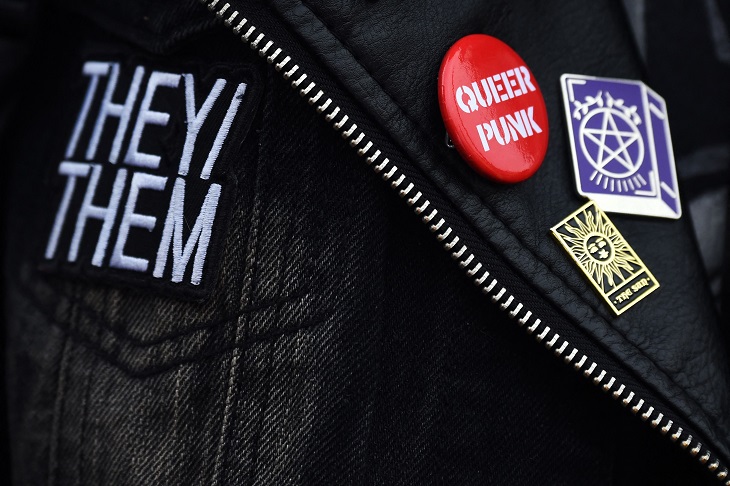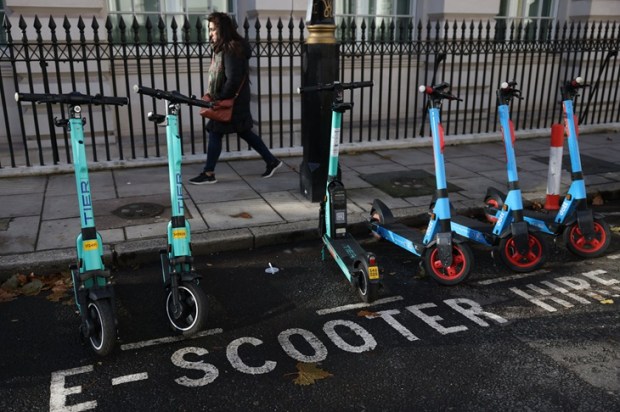The activist professional caravan has moved on. Hitting the social media headlines in 2017, the #MeToo movement disrupted the community for several years with its protests about violence against women.
Women’s rights had been the big issue in the social landscape until transgender victimhood became the new cause celebre. Protesters now undermine those very rights that they had previously demanded for women. This trans activist narrative revolves around a small number of ‘victims’ being blocked from female prisons, sports competitions, fitness clubs, and female-only activities. Those attempting to return the debate to the original issue of women’s rights are vilified on social media.
Free speech has again been the main victim, with several events in Australia being recently shut down by trans protesters. There has even been increasing violence after attracting extreme right-wing neo-Nazis to counter protest. Police protection has been required for the speakers.
The main speaker who is being blamed for this disturbance in the mainstream press is English anti-trans speaker, Kellie-Jay Keen-Minshull, known as Posie Parker. It was her rally in Victoria in March that was invaded by several hundred trans supporters, followed by a handful of alleged neo-Nazis.
The Victorian Premier, Daniel Andrews, supported the trans activists and made no comment about the right to express different opinions about women’s rights; the Victorian Liberal leader, John Pesutto, was no better with his attempts to expel Liberal MP Moira Deeming, who attended the meeting.
Those who want to continue as traditional feminists are now labelled TERFs (trans-exclusionary radical feminists). Posie Parker is due to visit New Zealand after her entry is was scrutinised by immigration authorities in the interest of public order.
Another event featuring NSW One Nation leader Mark Latham as a speaker, which was intended to be about religious freedom, was shut down as pro-trans protesters blocked entry to the meeting and found themselves set upon by a mob. The Left-wing media has tried to smear the TERFs with a connection to neo-Nazis and the same is happening with Latham; will mob violence prevent free speech, and the media prove the end of #MeToo?
America, as with all good things, has been the originator of this latest protest fad.
The United Nations International Women’s Day, on March 8, is recognised as a celebration of the women’s rights movement, highlighting ‘gender equality, reproductive rights and abuse against women’. President Biden’s wife presented a ‘Women of Courage’ award to 10 women and Alba Rueda, an Argentinian biological male who identifies as female, for his work as a LGBTQ+ activist and a special ‘envoy for sexual orientation’.
The UN calendar is running out of days for ‘special events’. Currently 205 days are listed, including such important days as Seagrass Day, Wild Bee Day, Bicycle Day, Asteroid Day, even an International Day of Banks. Transgenderism is the current focus of activism, but there is still no UN-sponsored transgender day. We can now look forward to an (unofficial) trans-gender week (most groups are satisfied with a day!) in November.
As is the case with transgender involvement in sports, schools, and prisons, women’s rights now has to take second place to this minority group. With a few notable exceptions, such as author JK Rowling, this produces no response from the media, politicians, or celebrities. And there is rarely a comment from sports organisations; such is the power of activism that a small minority can bully the majority.
Transgender numbers are debateable; the 2023 UK census suggested 0.1 per cent of the population identify as transgender, in 2016 in the US 0.6 per cent, Australia 0.17 per cent in 2021. It is likely these figures will increase as the gender ideology expands into children’s education and through social media, resulting in more children embracing gender confusion and deciding to seek out inappropriate medical interventions.
By way of comparison, women’s rights have been a battleground for over 100 years since emancipation, moving on to women’s property rights, marriage, and divorce laws, pay equality, and an ongoing fight against domestic violence. The advent of the second world war forced women out of the home and into the workplace, which was a major step toward equality. Most of these ideological battles had been won and early feminist activists had been able to rest on their laurels. Now, new battle has now begun for women, with transgender requirements out-ranking those of females.
In the early 20th Century, homosexuality was punishable by the death penalty or life imprisonment in many parts of the Western world. Decriminalisation occurred in 1984, and recognition is no longer an issue in Australia, though still so in other countries. In the 2021 Australian census, there were 1.5 million people who identified as gay, lesbian, bisexual, or other and there were 78,000 same-sex couples (an increase from 48,000 in 2016). The Australian Marriage Equality Act completed the journey to full social rehabilitation, with the paradox being that this occurred at the same time as declining enthusiasm for heterosexual marriage. As with women’s rights the war is won, now it appears that transgenderism is also undermining homosexual freedom, with events like Gay Pride in Sydney being overtaken by activist ostentation.
An increasingly apparent paradox is that, as some young people are attracted to the same sex, they are being directed into irreversible gender change procedures, rather than homosexuality; this is a threat to the homosexual community.
The third historical fight has been about race. Activists use the phrase ‘systemic racism’ to bully those who disagree with allusions to ‘Stolen Generations’ and ‘Frontier Wars’. They do this by exaggerating the past and implying those attitudes persist in the present. There is no doubt that there is disadvantage in Aboriginal town camps and continued disadvantage relating to alcohol, domestic violence, and child abuse. To that end, we have seen how the ideological desire to cancel welfare control and remove alcohol restrictions has exacerbated these problems.
Census figures show that 80 per cent of those claiming Aboriginality have adjusted to the so-called ‘invasion’ and live productive lives with everyone else. It is a small number (less than 100,000) of Indigenous people who have become the focus of attention. They are suffering from local community problems which are not caused by government inaction or neglect; after all, there are around 50 different Aboriginal support bodies and 12 representatives in Parliament. At their head is the National Indigenous Aboriginal Agency, created in 2019. This organisation has a tax-payer funded budget of $290 million, $160 million of which is spent on salaries, with little apparent effect on ‘closing the gap’.
In the 2021-22 Budget, the massive sum of $5.7 billion, over 4 years, was set aside for an Indigenous Advancement Strategy. Do we need to reduplicate this with ‘The Voice’?
In the 1800s, the Americans fought a civil war over slavery and the British navy stopped slaving on the high seas, facts airbrushed from history. Social problems with native populations are seen in many countries, with white colonialism the go-to explanation. Countries like America, (with a previous black President), or UK (with a current Prime Minister of Indian descent, and multiple Cabinet Ministers of different ethnicity) are still considered irredeemably racist. Multiculturalism promotes the superiority of every culture except that of the West.
In reality, all these historical problems are resolved, but the activist caravan does not pack up and go home, it increases its ultimatums or it finds fresh areas of protest. Author Douglas Murray believes the social pendulum is now swinging past the centre as more demands are made on the acquiescent majority. Activists have no purpose if all problems are solved, so old problems are pushed to the next level or new victimhoods are discovered. These professional activists move from one protest to the next, usually funded by the poor tax-payer; they are now reinforced by the next generation, whose education has been inculcated with the concept of victimhood.
The idealism of youth has always been a recruiting ground; Winston Churchill once said, ‘Anyone who is young and is not a socialist has no heart, anyone who is old and still a socialist has no brain.’ From the ban-the-bomb movement of the 50s, the Vietnam protests of the 70s, to human rights protests, activism will never end. Protesters will always want more. Sadly, a lack of knowledge of history means they do not know where they have come from – or where they are going to. For those ‘professionals’, there are new crises waiting to be discovered and new victims to be saved; if nothing new is apparent, there is always climate change to fall back on.
The expectation and entitlement that many young people obtain from their distorted education means they expect their world should be, but is not ideal. They perceive themselves as the latest victims of society. Freedom of speech is the real victim with the silent majority being abused and threatened. The end result is not progress, but continuing destruction of tradition, religion, and family, leading to the end of now much-derided Western Society; a society that many in other countries want to emigrate to, even if a vociferous minority within the country want to change it.
Got something to add? Join the discussion and comment below.
Get 10 issues for just $10
Subscribe to The Spectator Australia today for the next 10 magazine issues, plus full online access, for just $10.


























Comments
Don't miss out
Join the conversation with other Spectator Australia readers. Subscribe to leave a comment.
SUBSCRIBEAlready a subscriber? Log in